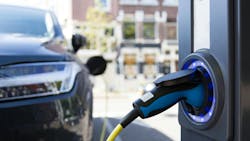New Jersey DOT Awards NEVI Contract for Electric Vehicle Charging Network
The New Jersey Department of Transportation (NJDOT) has been awarded a $20.96 million contract to build EV charging stations at 19 locations along NJDOT-maintained Interstate Highways.
NEVI Background The Federal Highway Administration (FHWA) National Electric Vehicle Infrastructure (NEVI) Formula Program funds the deployment of Electric Vehicle (EV) fast chargers along designated electric vehicle corridors to establish an interconnected EV charging network across each state and the nation. It is NJDOT’s intent to strategically deploy EV charging stations in New Jersey and to establish an interconnected network to facilitate equitable access and reliability.
“This historic contract is the first time NJDOT is funding construction of publicly accessible charging stations throughout New Jersey,” said Fran O’Connor, NJDOT Commissioner, in a statement. “As more drivers choose electric vehicles, building transportation infrastructure for the future is a significant step in achieving Governor Murphy’s vision to reduce greenhouse gas emissions, improve air quality, and make the state cleaner and more sustainable.”
As part of the NEVI program, NJDOT has designated 19 Alternative Fuel Corridors (AFC) on Interstate highways throughout New Jersey. Each AFC zone will have one Direct Current Fast Charging (DCFC) station. These charging stations will be no more than 50 miles apart and no more than one mile from the highway.
The DCFCs will be located outside of NJDOT’s Right of Way and eight of the 19 DCFC stations will be in disadvantaged or overburdened communities.
The contractor will choose the locations for each DCFC station with NJDOT approval. Each DCFC station will have four publicly accessible 150kW ports capable of simultaneous charging. Each port will have both Combined Charging System (CCS) connectors and J3400 connectors, also known as the North American Charging Standard (or the Tesla) port.
A total of 76 publicly accessible charging ports will be built under this contract. The expected completion of the project is summer 2027.
Source: New Jersey Department of Transportation, U.S. Department of Transportation
